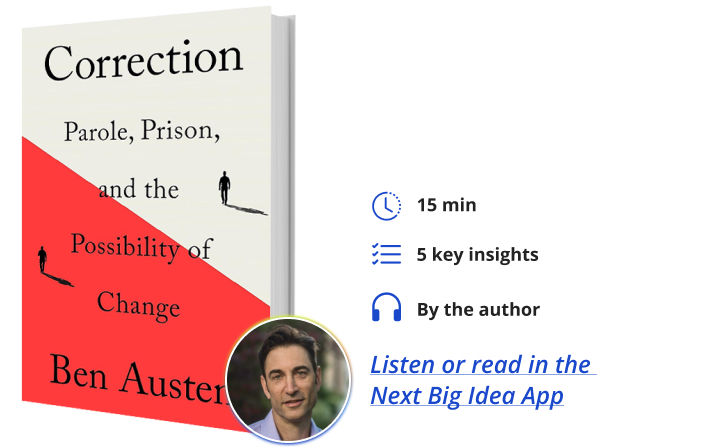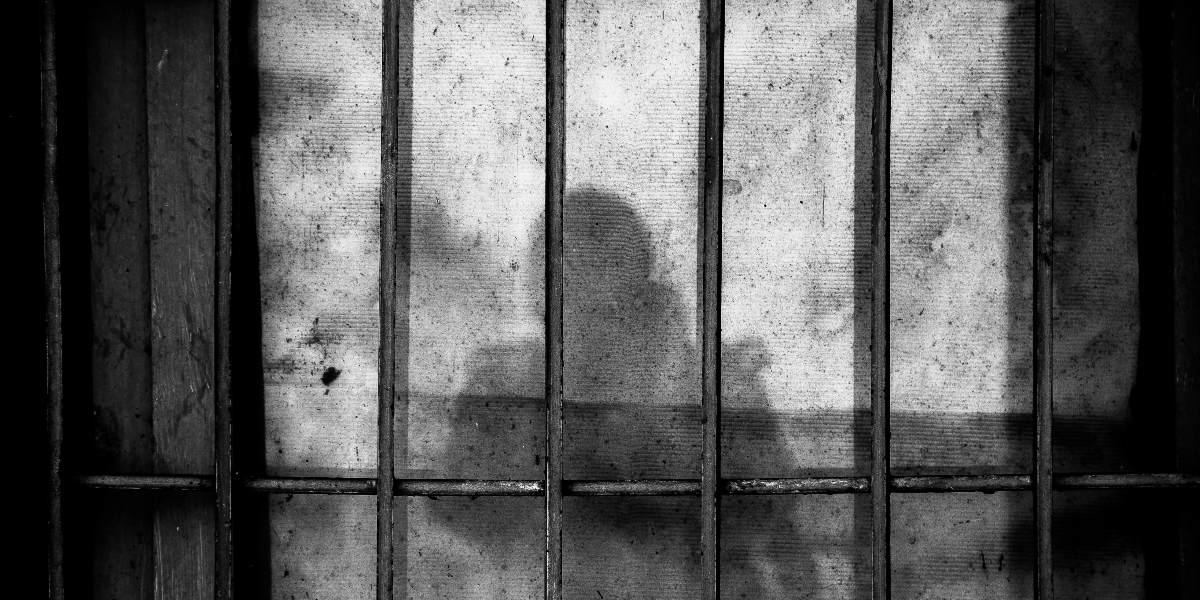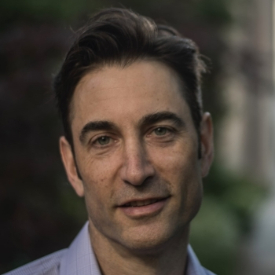Ben Austen is a journalist, a former editor at Harper’s Magazine, and the co-host of the podcast Some of My Best Friends Are. His feature writing has appeared in the New York Times Magazine, GQ, Wired, and many other publications.
Below, Ben shares five key insights from his new book, Correction: Parole, Prison, and the Possibility of Change. Listen to the audio version—read by Ben himself—in the Next Big Idea App.

1. As a country, we don’t know why we punish.
That’s a crazy statement. Consider that the United States today locks up two million people in prisons and jails. We, a single country, lock up 25 percent of all the world’s incarcerated people. It’s the thing that we do more than anyone else, but we don’t really know why we do it!
Prisons in the United States are called “correctional facilities.” But rather than correcting criminal behavior, they often create more crime. Guards—the correctional officers—are not trained to prepare people for reentry. And they’re certainly not rewarded for it.
So, what constitutes retribution or atonement? We don’t have a clear sense. We don’t know what someone who commits a serious crime must do to get a second chance.
This is part of why parole boards are so fascinating—because that’s exactly what they’re supposed to be asking. Parole boards explore these big questions about why we punish.
Does someone in prison deserve another chance? Have they done enough time? Are they remorseful? Rehabilitated? In this way, parole reveals this terrible problem. We have an extreme overreliance on incarceration when we don’t have a valid or just reason for why we do it.
Parole boards are caught up in that confusion. Courts rule on a crime, and parole boards are supposed to weigh everything that has happened since. But when parole boards deny someone, they usually use some variation of the same language. They say to parole someone would deprecate the seriousness of the offense, and promote disrespect for the law.
But that’s not a valid explanation. An offense doesn’t become less serious over time; a murder always remains a murder. And a crime, by its very definition, disrespects the law. You can see through parole boards how the past always dominates the present. It’s like a trap.
2. People change.
That’s obvious, right? We all change. But in terms of crime and punishment, this is critical, and it should be.
The vast majority of crimes are committed by people who are in their late teens to mid-20s. From there, people mostly age out of crime. Their brains develop. They grow up. All the evidence supports this. Nine in 10 homicides are committed by people under 35.
“The United States could let out nearly everyone in prison over 55 and see very little change in crime.”
Among the prison population as a whole, about 40 percent who leave are arrested again within three years. For people over the age of 50, though, the likelihood of another arrest is small—less than two percent. For people 65 and older, it’s near zero. The truth is, the United States could let out nearly everyone in prison over 55 and see very little change in crime. Yet we’re doing the exact opposite.
Older people are the fastest-growing age group in U.S. prisons. There are actually more people in prison today over 55 than the high-crime age range of 18 to 24. The sort of extreme sentences that are now commonplace treat people in prison as if they’re incapable of change. It is as if they’re the same at 35 or 65 as they were at 18.
One of the guys I write about is Johnnie Veal. He was locked up in 1970, at age 17. He’s now 70. He created a curriculum for people like him who were growing old behind bars. Johnnie said the long-timers needed a forum to work through their grief and shame. They needed a way to convince themselves that a slow death in a cell doesn’t mean their lives lacked meaning or dignity.
So, they put together their own legacies, something they could pass on. Picture albums. Packets of their achievements. Short autobiographies commemorating milestones. They prepared their last wills and testaments.
I remember a parole board member interviewing Johnnie and being amazed by this curriculum. The work Johnnie was doing in prison said so much about his character. The board member offered what he meant as a lighthearted compliment. He told Johnnie, “We might need you more in prison than we need you out.”
3. We should believe in second chances, but in practice, we don’t.
Not too long ago, a group of incarcerated men held a public debate at a maximum security prison in Illinois. More than 20 state legislators came to the prison to attend. The topic of the debate: giving everyone locked up in the state a chance to appear before a parole board.
Illinois abolished parole in 1978. That means that only people convicted before 1978 can come up for parole consideration. None of the debate team members were eligible for parole. They wanted the opportunity to prove their worthiness for release.
At the end of the debate, the lawmakers gathered around the men. Many of the politicians admitted that they had no idea there wasn’t parole in the state. Like you, perhaps, they assumed the possibility of a second chance was an integral part of any justice system. They thought that a second chance was an integral part of any society. They assumed it was part of our values.
“We have as many people with life or virtual sentences today as the entire prison population in the 1970s.”
But Illinois is not an outlier. A total of 16 states have gotten rid of parole consideration. The federal prison system ended it for anyone convicted after 1987, and every state that has passed tough-on-crime laws has excluded many crimes from the possibility of parole. So, only a small fraction of their prison population has this opportunity.
Mass incarceration in America turned 50 this year. At its start, in 1973, there were 200,000 people total in all state and federal prisons. Today, there are 200,000 who are serving life without parole or mandatory sentences that are so long that they amount to the same thing. They have no second chance. I’m going to say that again: We have as many people with life or virtual sentences today as the entire prison population in the 1970s.
At the Illinois prison debate, one of the guys talked about this. His name is Oscar, but everyone calls him Smiley because of the way he radiates friendliness. He argued that life sentences were supposed to be reserved for the worst of the worst. He asked if 200,000 people were so irredeemable that they deserved to grow old and die in prison. Were that many human beings so abominable that they never deserved even a chance to prove otherwise?
Thirty years earlier, Smiley had been offered a plea deal of eleven years. When he fought his case in court and lost, he was sentenced to life without parole. Smiley asked the lawmakers, “Was I a monster who threatened the very fabric of society like the natural life sentence suggests?”
4. Parole tells the entire story of the criminal justice system.
The first time I visited a parole hearing, I was blown away. It was all storytelling. It was almost like a contest of who could tell a more compelling narrative. You had stories of decades-old crimes and stories of decades spent in prison. There were stories of victims and stories of rehabilitation, or even of innocence.
The contest was in no way a level playing field. The stories of past crimes always started way in the lead. They felt forever present tense. They were given more weight. As a storyteller myself, I wanted to make sense of this competition. Also, in a way, I wanted to enter it myself, to try to shift the narrative.
But something else I saw there also hooked me. A parole consideration contains everything that comes before it. A crime, time in prison. Parole tells the story of the entire criminal justice system, including the enormity of who we punish (or free) and why. In that way, parole also turns out to be a clear window into these last 50 years of mass incarceration and, in many ways, into the story of the United States over these years.
5. Parole is and isn’t a solution to mass incarceration.
After doing this work, I’m convinced that parole is a needed system of second chances. It should be reinstated in places where it was abolished. Parole eligibility should be expanded across the country. That’s part of a long overdue correction to our overreliance on imprisonment. More parole across the country would give hundreds of thousands of people in prison serving extremely long sentences a shot at being returned to useful citizenship.
“A storytelling contest cannot be justice.”
Those guys on the debate team at the maximum security prison went on to form a group called Parole Illinois. They are pushing changes to the law to give everyone in prison in the state a shot at parole. They are pushing not to let people out automatically, but for people to get a chance to be seen and heard by a parole board.
Here’s why parole may not be a solution. After sitting through dozens and dozens of parole hearings, I saw moments of grace. More often, though, the hearings were incredibly subjective, arbitrary, and prone to bias. A storytelling contest cannot be justice.
Expanding parole works only if those changes usher in other necessary reforms. In prisons, we need to be creating effective educational and rehabilitation opportunities. We also need assurances that parole boards will operate more openly and fairly. These reforms need to include better ways to heal and protect those harmed by violent crimes. A better system won’t work if those finally released continue to be set up to fail.
We all should want a society that holds people accountable while still valuing their humanity and caring for those hurt by crimes. That’s the goal. More parole is not the point, but parole could be a pathway to radical change and a more just country.
To listen to the audio version read by author Ben Austen, download the Next Big Idea App today:































